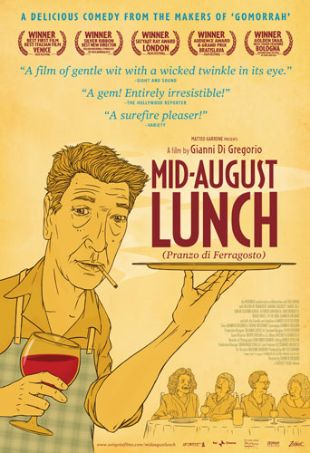Anyone familiar with the experience of being in an elderly Italian mother's garrulous presence for more than about 30 seconds will get an extra charge out of the thoroughly enchanting character comedy Mid-August Lunch. It's the low, low-key tale of Gianni (writer-director Gianni di Gregorio), a middle-aged retiree who shares a flat with his wizened nonagenarian mom (Valeria de Franciscis) in a pleasant Roman neighborhood. The movie opens during August, a month when virtually all Italians vacate the city, and shops and businesses temporarily close. Severely behind on rent, and facing the threat of utility severance, Gianni finds a solution in the form of an unusual barter presented to him by his landlord, Alfonso (Alfonso Santagata): the administrator will erase the debt entirely if Gianni agrees to temporarily board the man's elderly mother (Marina Cacciotti) for a short period. With no other options in sight, Gianni consents, but the landlord also thrusts an elderly aunt named Grazia (Grazia Cesarini Sforza) onto Gianni without asking him; then a fourth guest turns up when a physician asks Gianni to temporarily board his elderly mother, Maria (Maria Calì). Before long, the man's flat is filled with several gregarious, opinionated, and eccentric elderly women, and sleep and peace of mind don't appear to be options for the poor Gianni.
This is a very slight and subtle film -- as delicate and wispy as any comedy in memory -- but tune in to its wavelength, and the pleasures are considerable. On the most basic level, it possesses a warm heartiness, an innate adoration not simply of its characters but of the laid-back, epicurean lives they lead, that makes the sun-drenched Roman environs onscreen subtly intoxicating. By painting each of the women as a highly unique and idiosyncratic individual, slowing the narrative to a measured pace, and maintaining an acute spectrum of observation (aided by numerous close-ups), di Gregorio manages to find humor in the most mature and intelligent of sources: the offbeat behavior of his subjects. There is, for example, a great deal of wry amusement to be found in the landlord's persistent refusal -- minutes after he has sneakily slipped his aunt into the barter with Gianni -- to make eye contact with an exasperated Gianni, or in the dialogue between Maria (who must contend with severe dietary restrictions) and Grazia, when she repeatedly persists in telling Maria just how much she is missing thanks to her inability to sample the decadent macaroni casserole.
As a scenarist, di Gregorio toys with the limits of his lead character's exasperation, and there comes a moment -- just one, and only one -- when the character of Gianni attempts to cope with the aggravating domestic situation on his hands by taking a rather drastic step that seems to violate about a dozen ethical standards even as it generates real laughter. But the writer-director seems to realize that pushing too far in this direction would ruin the tone of the film, and at this very moment, he instinctively steps back; he not only preserves the wry (and light) tone of the picture by avoiding any real consequences of note from Gianni's trespass, but moves into a more humanistic groove from that point on, which enables us to begin to feel affectionate toward the women at about the same time as Gianni's character does. The film's upbeat denouement emerges from this shift; it may risk being a little bit too pat or cute, but has its heart in exactly the right place and, like the film as a whole, leaves the viewer with a sense of infectious, enduring satisfaction.
